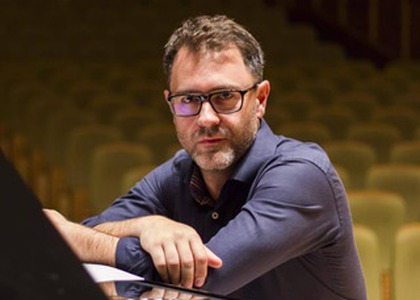> [Archived] Interviews

Interview with pianist Ștefan Doniga
The National Culture Day is marked by the violinist Diana Jipa and the pianist ȘtefanDoniga through two projects that will take place during January, materialized both through a tour and through a series of online events. More details from the following interview with pianist ȘtefanDoniga.
On National Culture Day, you will perform, together with the violinist Diana Jipa, a recital entitled Romania Universalis, which will take place at the Ion Dacian National Operetta and Musical Theater. The event is just the beginning of a tournament under the same motto. How is the concept of this tournament associated with the significance of the moment?
The tour wants to bring to the fore the idea of diversity and identity, at the same time, from the Romanian culture, because the repertoire of this recital and in fact of the whole project - is a larger project, which does not only include the recital tour - The repertoire includes eight works, each composed by a Romanian composer or assimilated to the Romanian cultural space, but of a different ethnic origin. So, we want to realize this stylistic fan, to illustrate this wealth of sources of inspiration in Romanian culture and we believe that in this way we illustrate well, we illustrate consistently, which means the richness of Romanian culture.
A unique element of this project is the fact that you will launch online, videos of the songs included in the tour program that will be presented by personalities of Romanian culture. Who are the guests?
We wanted to bring this original note to this project. Beyond the tour there will be this series of videos, because in the last year and a half, forced by circumstances, we also specialized in making videos. We will attach to each of the works an introduction made by a personality of the Romanian cultural life and which belongs to the ethnic area, the cultural area from which the work also comes. We will have all these materials on our pages.
In parallel, you run a second project dedicated to the National Culture Day, entitled Ballad 2.0. What is it?
It is also an original approach, which we want to be very modern, of a work from the Romanian classical repertoire, probably the most famous instrumental work from the Romanian creation, namely Balada by Ciprian Porumbescu. I had the idea to propose to four composers of music of very different nature to process themes from the Ballad of Ciprian Porumbescu and to make independent musical works, which will then be also presented in the form of a video, in materials that will be launched online. Therefore, we wanted to show that the classical values of Romanian culture are perennial and that they have a continuous capacity to influence and inspire contemporary creation. There will be works made by the young and very talented composer Vlad Răzvan Baciu, therefore, of classical workmanship. It will be a work in electronic style, monumental electronic music, made by the composer of electronic music and film Mihai Toma, a variant also made with the support of the Orchestra and Choir of the National Operetta and Musical Theater Ion Dacian from Bucharest. It will be a jazz version, proposed to the pianist Sorin Zlat and which will be performed together with the instrumental trio he leads and a classical pop version, which I performed together with Diana Jipa and which I used as a generic for the many films we made in Romania.
Translated by Medeea-Alexandra Stan,
University of Bucharest, Faculty of Foreign Languages and Literatures, MTTLC, year I
Corrected by Silvia Petrescu














